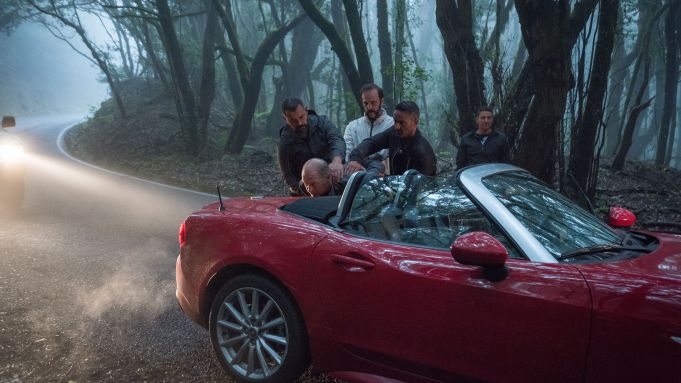“The Whistlers” is the latest film from Romanian New Wave director Corneliu Porumboiu, who flexes his cinephile roots in this genre mashup of noir and westerns.
Police officer Cristi (Vlad Ivanov) journeys to the island of La Gomera to learn a secret whistling language. He is a corrupt officer playing two sides in an attempt to win big, and the elusive language is a perfect way to escape constant surveillance. Wearing its noir tradition on its sleeve, “The Whistlers” quickly envelopes Cristi in an ever-growing cast of secretive characters, sprawling plots and a classic femme fatale.
In a traditional noir the protagonist is typically a private eye: stoic, morally grey, but with a sense of justice. Here, we have Cristi. He is stoic, bordering emotionless, but absolutely lacking anything close to a moral compass. While it’s hard to connect with or root for Cristi, if you take a step back, he provides a subtle subversion of the noir tradition; a significantly more corrupt protagonist that the viewer can relish stumbling through the twists and turns.
Porumboiu is not always so keen to subvert though. The aptly named Gilda (Catrinel Marlon), a sure reference to 1946 noir film “Gilda,” is about as standard as a femme fatale can get. In a film so reliant on being contemporary, what with the constant digital surveillance, her role would fit soundly in a film made in the ‘40s, a fact made more apparent by the camera’s not-so-subtle tendency to linger on her.
How does the plot fare, then, if the characters are just pawns to get lost in it? It’s hugely disjointed and discombobulating, nonchalantly jumping between time and place. This film requires a significant amount of focus to tie it together, leaving viewers with a perpetual lack of knowledge.
“The Whistlers” also contains quite a unique brand of comedy in the best way it could. Porumboiu, in a Q&A, noted that he instructs his actors to play every scene as seriously as possible, no matter how comical the writing may be. This results in a humor that occasionally seeps it way into the film. It’s a way to lighten the tension while not breaking the tone, with varying degrees of success.
Porumboiu is certainly throwing his love of noir onto the screen here. The plot of “The Whistlers” stands out, but the characters, while sometimes having sharp and entertaining interactions, don’t pull their weight independently. Yet the plot repeatedly crosses the line between exciting and pure confusion. The plot can still be bogged down through its intentional deception, but the high points of the film reward its strong effort at focus. Success for “The Whistler” ultimately hinges on the audience’s appreciation for noir and a maddening plot trajectory.
Email Nicholas Weid at [email protected].

























































































































































